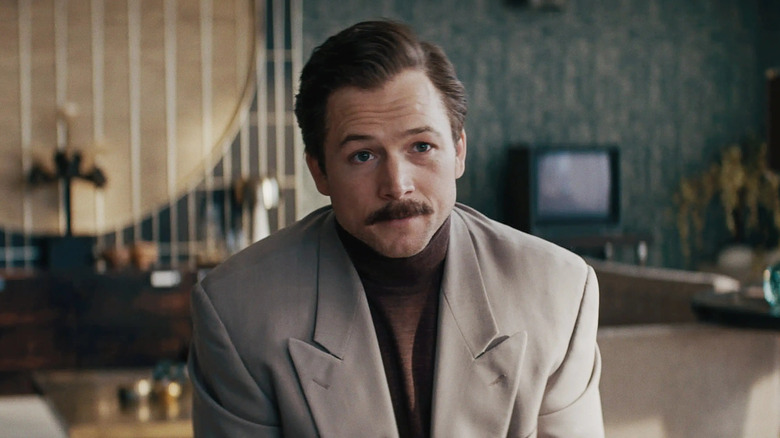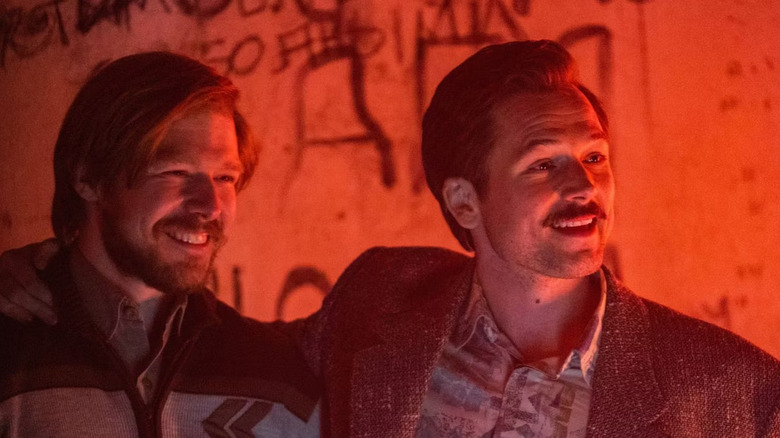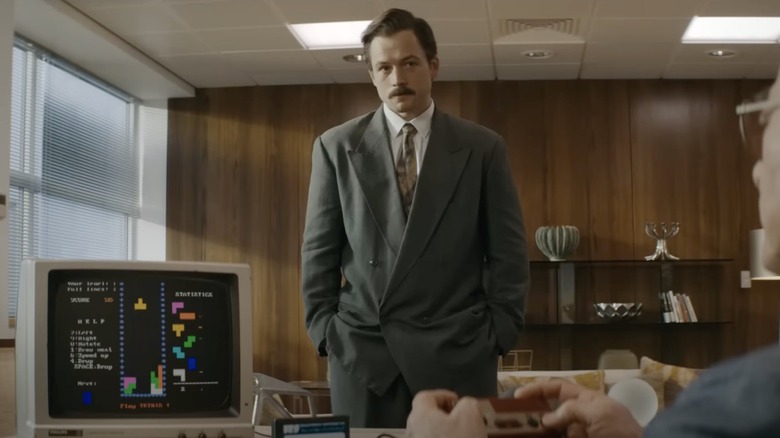Tetris Review: The '80s Classic Contains A Thrilling Backstory
- A fun popcorn thriller, that gives this oddball story the larger-than-life biopic treatment it deserves
- Possibly Taron Egerton's finest big screen performance to date
- Sometimes a little bit too over the top for its own good
- If you're expecting "Tinker Tailor Soldier Spy" in the world of video games, this will not be for you
Whether it's because major corporations want us to fall back in love with them during this era of late-stage capitalism, or simply because filmmakers want to replicate the critical and commercial success of "The Social Network," 2023 is shaping up to be the year of the corporate drama at the movies. In the coming weeks, we'll get an A-list blockbuster set entirely in the inner workings of Nike and a biopic charting the rise and fall of the first smartphone — underdog stories about unlikely successes which all just happen to be set amidst a plethora of boardroom meetings. Just how riveted audiences will be by the attempts to woo Michael Jordan into signing a deal to get his own branded sneaker are anybody's guess (although the initial reactions seem unanimously positive). Still, it's safe to assume the most crowd-pleasing entry in this emerging subgenre will be one that's not even hitting the big screen at all.
"Tetris," arriving on Apple TV+ on Friday, March 31, is less a corporate drama about the fight for the worldwide rights to the Soviet computer game, and more an overblown spy thriller set comfortably behind the Iron Curtain. It's based on a true story seemingly too ridiculous to be true, but that hasn't stopped screenwriter Noah Pink from heightening it even further; in his hands, this becomes a populist tale that refuses to be subtle, filled with cliched Russian villains, over-the-top car chases and cheesy needle drops. It's less John le Carré and more Austin Powers. On paper, this sounds like an unsatisfying way of dramatizing a wild, long-forgotten tale of corporate intrigue in the dying days of the Soviet Union, but somehow in practice, it proves extraordinarily satisfying, a true story so far-fetched it would completely fall apart if told in a grittier style.
A popcorn spy thriller
As will likely be the case for many viewers, I wasn't aware of the true story about how "Tetris" made its way out of the Soviet Union and onto consoles over the world prior to watching Baird's film. Initially, it doesn't seem particularly compelling. Dutch American entrepreneur Henk Rogers (Taron Egerton) is introduced to us at a video gaming convention, trying to get buyers interested in the Japanese game he's bought the rights to ("it's like chess, but more complicated"). He's failing and at risk of losing considerable investment money because another game is making waves: Tetris. He's enamored, snaps up the rights immediately, believing this to be the next big thing, and sells Nintendo on the idea of this being the next arcade and console blockbuster.
So far, so a mildly diverting tale of one yuppie chancer making good at the time he needs it the most. However, things quickly start falling apart when Henk receives a worrying call: He's not the only one who believes he's in possession of the rights, and intervention from its current copyright owner is needed to ensure he can officially obtain them and turn Tetris into the megahit he's convinced it will be. The only problem? That company is based in Moscow and is an obvious shell company formed by the government; to smooth things over, Henk will need to travel to the suspicious East to make a deal. That could take months, though, so he risks arrest and travels on a tourist visa and is immediately put under surveillance after his first arrival in the Soviet capital.
This popcorn take on a paranoid conspiracy thriller provides the film's most exciting moments, even if it doesn't feel like an accurate reflection of Russian life during this period of recent history. We're told throughout that more and more people are taking to the streets demanding their democratic freedoms, and that the Communist governments are innately aware their days are numbered. And yet, due to the need to keep the tension building, it feels like most people in the country are KGB informants, much like how every other person in the "John Wick" universe is an assassin looking to claim their next bounty. Perhaps the biggest suspension of disbelief required of the audience is just how much the character of Henk is oblivious to this, accepting that obvious spies such as the woman who claims to be his tour guide are who they are at face value. That Henk is an executive producer on the film, alongside Tetris creator Alexey Pajitnov, suggests he isn't afraid to have himself depicted as a fool if it makes for a satisfying crowd-pleaser.
Over the top but no less gripping
It also certainly helps that Taron Egerton is a magnetic presence in the lead role, selling the charismatic, eager-to-please nature of the character so much that it becomes easy to overlook that the screenplay writes him as a top-tier bull artist who keeps getting lucky. The film does undersell many of the character's more reckless financial decisions in its early stretches to ensure he remains a likable protagonist, but these feel like unnecessary concessions — in a story like this, it's the questionable decisions made in the pursuit of success that are the most dramatically engaging. This genre isn't afraid to depict flawed protagonists, but "Tetris" wants Henk to be a fish-out-of-water audience surrogate as much as it wants him to be a larger-than-life figure willing to do anything to close a deal. It's a needle very few actors would be able to thread as successfully as Egerton does here, and the fact he accomplishes it might just make this his finest screen role to date.
Director Jon S. Baird never hides his aspirations to entertain a broad audience, knowing that the best way of translating a story about boardroom deals for mainstream moviegoers is to ensure it's played as unsubtly as possible. With the noted exception of Alexey (played here by Nikita Yefremov, in the film's sole subtle performance) and his family, the Russian characters we're introduced to are uniformly untrustworthy, constantly following our protagonists and armed with lots of evil plans to stop their corporate takeover of a Soviet company, including threatening the lives of very young children. The rival media moguls going up against Henk are equally monstrous creations. Character actor Roger Allam transforms into disgraced billionaire Robert Maxwell via a body suit that makes Tom Hanks' transformation in "Elvis" seem like social realism. At the same time, his son Kevin (Anthony Boyle) is depicted as a spoilt nepo baby, their dynamic like that of Logan and Kendall Roy in "Succession" if that show were written as an '80s underdog drama. This broad characterization of all the major players only shows restraint when it comes to the member of the Maxwell family who isn't mentioned, as the film features zero winking references to Ghislaine — her tangential connection to this story will only be revealed to viewers who embark on a Wikipedia deep dive as the credits start rolling.
Although "The Social Network" proved you can mine impactful drama out of corporate bust-ups in the tech industry, it never aspired to be a mainstream hit in the same manner as "Tetris". Much like director David Fincher's film, Baird seems to care the most about the specifics of its legal battles, and endless cat-and-mouse chase to maintain ownership –- only he transforms this into a more conventionally audience-friendly work by making sure his actors play this material as big as possible.
You might not be able to follow the various webs of corporate intrigue it sets up, but with brilliantly realized moments of spy-thriller paranoia, delightfully devilish villains, and a gag-heavy screenplay unafraid to commit to the most far-fetched cliches, it becomes satisfying nonetheless. It might be too silly for aficionados of the espionage genre, especially for a film based on a true story, but it's hard to deny just how gripping it is despite its lack of grit.
"Tetris" hits Apple TV+ on Friday, March 31.


